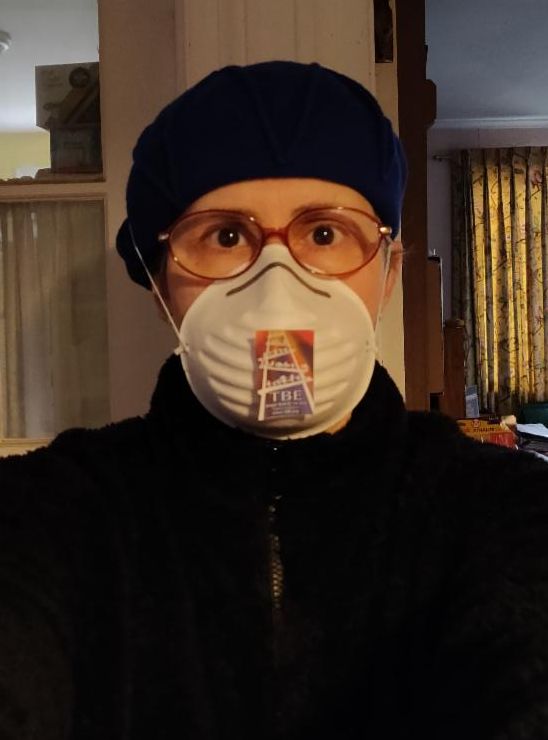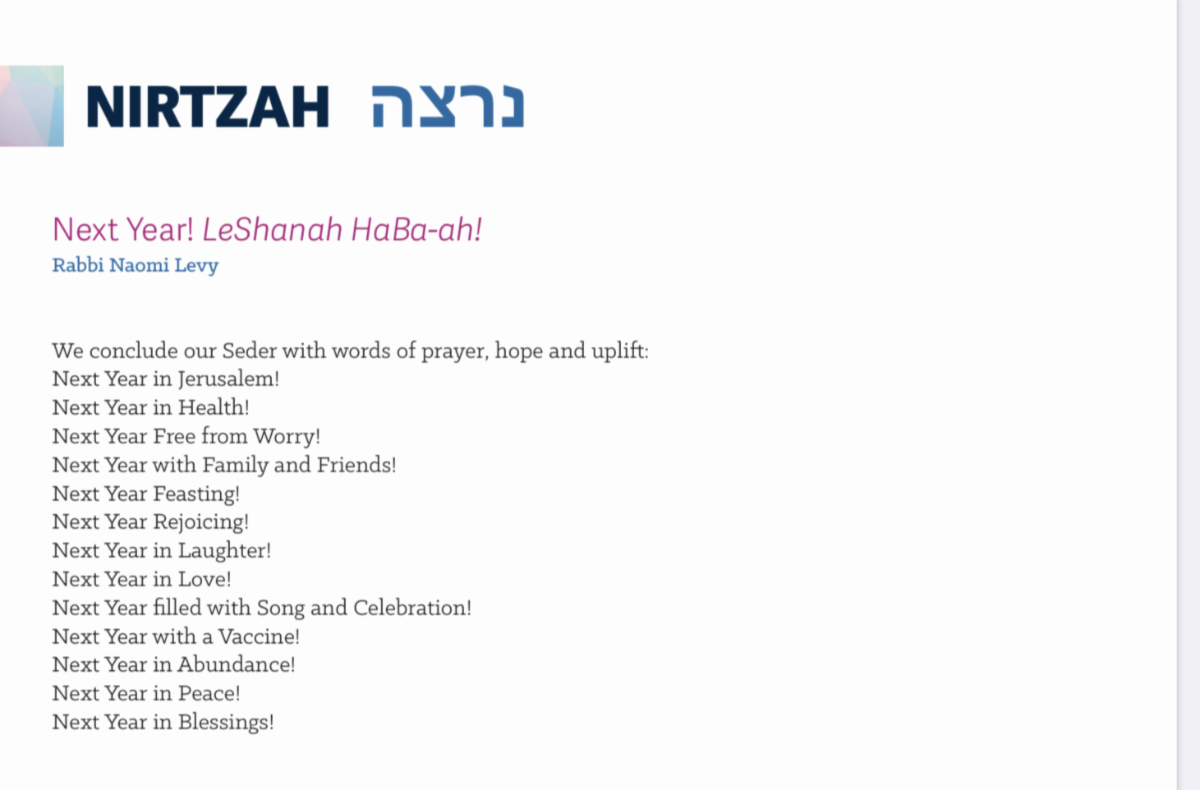From the Rabbi's Bunker

I briefly emerged from the bunker to take this springtime photo of TBE's cemetery

A storefront sign in - where else - New Zealand.
According to the Washington Post,
Meanwhile, in Israel Ha'aretz reports this news...

And finally, Mindy Rogoff sends this photo with the comment:
"I don't mind the cooking...BUT! I could do without the cleaning!

To quote Randy Newman's song, "Strange things are happening."
As we prepare to usher in Passover on Wednesday evening, which will be followed by the first two days of the festival and then Shabbat, this is the last dispatch from the rab-bunker that you will be receiving before the weekend. If you need to reach me, I will be monitoring email as needed, but except in emergencies, please do not expect a response until Sunday at the earliest, once the festival has begun.
So while it is a few days off, a reminder that our upcoming Zoom events will include services on Friday at 6: https://zoom.us/j/775369802
Telephone: (646) 558-8656
Meeting ID: 775 369 802
And Torah Discussion, Shabbat at 11:00am, led by Rabbi Ginsburg: https://zoom.us/j/620787208
Telephone: (646) 558-8656
Meeting ID: 620 787 208
And don't forget today's guaranteed minyan at 1 PM. Click here to connect. Clickhere to download the mincha (afternoon) service pdf:
Finally, a request: As we head into a Passover different from all others, I'm asking you to send me screen shots from your family gatherings and Zoom Seders. I'd love to see our extended TBE family tree branching out far and wide.
 |
See Yad Vashem's online exhibition on Passover before, during and after the Holocaust. The photo above is The Passover Haggadah that 17 year old Elimelekh Landau prepared as his father quoted from memory when the family of five were in hiding in Boryslav
Mitzvah Moments...
Here are some opportunities to bring some goodness into our troubled world:
Writing in today's Washington Post on how to find meaning on Passover during a pandemic, Rabbi Elie Kaunfer cites a letter from 9th-century Babylonia: Rabbi Mattityahu Gaon said that it is our responsibility to feed the poor in advance of the Seder, so they wouldn't have to go out and beg on Passover night. "Take care of the hungry days earlier," he said, "and then recite this line ("Let all who are hungry come and eat") knowing that those who are hungry are, indeed, being fed."
In that spirit, on Wed. morning from 8 AM - Noon you can drop off bags of non-perishable food for our emergency drive for the Food Bank.
Turn your hametz into a mitzvah!
And here are two other mitzvah options...


Happy Passover to our extended TBE Family
Be Kind to Yourself...
This generation has never known a Passover when we were faced with such uncertainty and sadness. The fear and grief are palpable as the circle of the afflicted grows ever larger and yet more intimate at the same time. I share with you this passage, written over the past several days as a complement to the Maror (bitter herbs) section of the Seder. We'll be utilizing this and other readings from the Rabbinical Assembly 5780 Haggadah Supplement during our Zoom Seder on Wednesday.

It is hard to feel gratitude at a time like this - we had a long discussion about it last Shabbat morning. But gratitude is what can give us the strength, and maybe a modicum of hope, to surmount the challenges ahead.
This year of all years, there is a natural temptation to want to pass on Passover entirely, or at least to accept your matzah half baked - a sentiment expressed in this tweet:

Personally, I would rather not combine Passover and Rosh Hashanah, though stale honey cake does seem to find its way into both. I'm not even thinking of Rosh Hashanah, frankly, except to imagine that it, like everything else this crazy year, will feel very different.
But the "be kind to yourself" part is very important. If that means not going back to the supermarket that one extra time, it's okay. You can do without that extra bottle of Manischewitz this year, especially when it is demonstrably dangerous for us to go there more than absolutely necessary.
Be kind to yourself. That's why we are supposed to eat in a reclining posture, which, according to Maimonides, is how royalty eats. We should treat ourselves like royalty. On Passover, as the fourth question reminds us, everyone reclines.
And on this Passover, we should relax as well. The forecast looks somewhat rainy and cool for the holiday, but today, Tuesday, it's supposed to be lovely - a great day to get those deck chairs in order.
So it's fine to loosen the reins this Passover, even if it means not being quite so obsessed with the prep, the presentation - and as far as the cleaning goes, we're already in hyperdrive about that.
But there is something about this holiday that can help make the coming weeks much more manageable. As we sit lonely in our homes, see how Passover helped Natan Sharansky in the Soviet gulag, where he was imprisoned for nine years, half of it in solitary confinement. See this anecdote shared in the Rabbinical Assembly Haggadah Supplement:

Today we are slaves. Next year we shall be free.
Be kind to yourself...by letting the Haggadah strengthen you; by letting the virtual embrace of family and community strengthen you. Be kind to yourself; kind enough to capture that glimmer of hope and never let it go,
Hag Kasher V'Samayach - A Sweet Passover to all.
And my final bit of rabbinic advice, by way of Isaiah:

For that, too, shall pass.
-------------------------
Click here to view and download the Rabbinical Assembly Passover guide
Searching for Hametz: Finding Our Priorities by Candlelight (MyJewishLearning) In the age of the coronavirus, the search for leaven by candlelight becomes even more apt
How the shankbone and egg became symbols on the Seder plate (TheTorah.com)
For sale of Hametz... Scan and email to me.
Finally, see below Rabbi Michael Strassfeld's meditations for each part of the Seder, geared to our unique situation this year, followed by Rabbi Naomi Levy's 2020 version of "Next Year in Jerusalem."
Journey to Freedom Through the Steps of the Seder
Kadesh-We begin by striving to uncover the sparks of holiness in the world. Too often in life they are obscured by our noisy frenetic pace. Now they are hidden by our fears amidst the quiet of social distance.
Urhatz-We cleanse our hands from the tum'ah, the impurity of the virus and the paralysis of fear.
Karpas-We hold the symbols of spring that remind us that the life of the universe continues its cycle of death and of rebirth. The new green sprouts break through the kittel, the lingering shroud of the snow of winter. Still, we dip the hopes of spring into the salt water of current loss.
Yahatz-we take matzah and break it in half. We start the seder with matzah as the bread of affliction. Even that symbol is broken and incomplete. We hide it away searching for answers during the night.
Maggid--In a time of isolation, we must remember that humans are defined by our ability to speak. We cry across the electronic void hurling words of connection to those near and far. It is true lo tov heyot adam livado-it is not good for people to be alone.
We speak of the four expressions of redemption:
Freedom from fear
Freedom to hope
Freedom from inequality
Freedom to care
Rahtzah--We wash again. This second washing is different for we have added a letter "heh" to the end of the word. We feel more connected to the holiness of the universe, to each other and to the Holy One, the "heh." We can now bless our hands by reaching out to help those in need as it says with a strong hand and an outstretched arm you will help lift others out of their Egypt.
Motzi Matzah--We need to find (motzi) the matzah. All the blows of the taskmasters can be seen on its pockmarked surface. Yet it has become the symbol of freedom. It reminds us that once upon a time we left Egypt. The only thing we carried with us into freedom was matzah. It was enough-dayenu.
Maror--We taste the bitterness of this very moment. For the reality is we never completely leave Egypt nor make it to the Promised Land. We are always on the way. It is in the seeking not the finding that life is lived. Yet, tasting matzah, we are better equipped to confront the bitterness that is our lot. Therefore:
Korekh--The deeper truth is that there is no slavery and no freedom distinct from each other. They are not separate realms. Thus, we take matzah and maror and eat them together, no longer imagining that we can separate them. Korekh means to embrace---to embrace all of life.
Shulhan Orekh--The pedagogy of the seder rests on our eating the experience not just talking about it. We ingest the bitterness and the freedom. By the time we get to the meal itself, it is freedom we eat as we remember the key lesson of the story-having once experienced freedom, we know deeply it is possible to be free again.
Tzafun--We began with matzah as the bread of affliction. It then became the symbol of the Exodus and finally it is the afikomen. The hidden is revealed. The afikomen points to the messianic future waiting to be announced by Elijah standing at the door of humanity. If only we would fully realize the potential that is in the world and that lies in our hand, the door to freedom could be thrown wide open and kol ditzrikh yaitei ve-yifsakh-all in need would celebrate the great redemption of Pesah.
Barekh--we are grateful for the blessings of our lives and even more God's promise to Abraham "heyeh berakhah" live your life in such a way as to be a blessing to others.
Hallel-we join with Miriam as we open our hearts and lift our voices in song-it is the only way to cross the sea.
Nirtzah--The Psalmist says: "open your hand and satisfy every living thing be-ratzon with will". It is a mistake to understand that verse as meaning God gives every living being what they desire. That is not our experience. What we are given is ratzon-a will to live, to love, and to give. Now we are ready for the journey to freedom that lies ahead.

May all your loved ones find only peace, sweetness and good health!
Hag Samayach V'Kasher,
Rabbi Joshua Hammerman

No comments:
Post a Comment